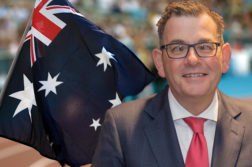This is the second in a two-part series about the history of Australian border policy. Read the first part here.
The Gang Of Four
When Parliament resumed in 2005, four Liberal Party Members of Parliament, Petro Georgiou, Russell Broadbent, Bruce Baird and I, met to discuss concerns about indefinite mandatory detention and its impact on children.
Petro Georgiou had commenced drafting a Private Members Bill to amend the Migration Act. Once the drafting was complete, the group met with then prime minister John Howard to advise their intentions. To avoid the embarrassment of a split on the benches, the prime minister asked for time to speak to his cabinet colleagues.
During the hiatus, the mistaken and unlawful detention of two Australian citizens, Cornelia Rau and Vivian Alvarez Solon, aroused considerable public disquiet and sympathy. Cornelia Rau was erroneously held in immigration detention for 10 months and Vivian Alvarez Solon wrongly deported and “dumped” at the Manila airport in a wheelchair. Inquiries into both cases led to a damning exposé of inadequate care, lack of openness and scrutiny in the system and the pervasive culture of “denial and self justification” within the Department of Immigration.
Public alarm over detainees covertly held indefinitely heightened with the case of Peter Qasim, a stateless person detained for seven years. Qasim’s case became a cause célèbre when it was taken up by prominent businessman Dick Smith. The Sydney Morning Herald revealed the government’s decision to soften its hard line on mandatory detention. Under a headline 'Free at last, but a prisoner still of his tortured mind', it disclosed that Qasim would be one of 50 people locked up for more than two years, who would now be summarily released on bridging visas.
Churches, non-government organisations and a growing number of web-based social media commentators exerted growing pressure on government to change the policy. The threat of a private members bill was a crucial element in the government’s turnabout. The government announced that “a child shall only be detained as a matter of last resort”.
The Ombudsman was to review cases of detainees who had been in detention for more than two years and make recommendations about their release. The minister was required to report the recommendations to Parliament within 15 days, but could not be compelled to act on them. Other elements of the changes forced by the backbenchers included an agreement to place time limits on the processing of protection visa applications and offer the existing 4000 refugees on Temporary Protection Visas (TPVs) permanent protection within 90 days.
Winding Forward, Winding Back
In 2007 the Rudd Labor government was elected. As the boats slowed, the new government made good its election promise to dismantle the “Pacific Solution”. It ended TPVs and abolished detention charges. Mandatory detention and ‘excision’ of the migration zones remained firmly in place.
Two years later, boat arrivals bounded from seven in 2008 to 60. A deepening sense of panic gripped the government. A withering attack was unleashed by the Opposition accusing the government of not protecting the borders and encouraging smugglers.
The government suspended processing refugees from Afghanistan and Sri Lanka claiming that the situation in both jurisdictions was evolving and that the “Taliban’s fall, durable security in parts of the country and constitutional and legal reform to protect minorities’ rights have improved their circumstances.” This led to increased periods of detention, overcrowding and outbreaks of violence. Incarcerated children became a resurgent issue.
Flagging polls, further boat arrivals and a relentless campaign by the Opposition were among the issues which led to a change of leadership from Kevin Rudd to Julia Gillard on 24 June 2010. With an election imminent, the new prime minister cast about for her own version of the Pacific Solution. Senior political journalist Michelle Grattan reported “the dog whistle is sounding like a wolf howl” and quoted part of Gillard’s speech announcing the latest proposal:
“Hardworking Australians wanted to know refugees settled here weren’t getting special treatment. People like my own [migrant]parents who have worked hard all their lives can’t abide the idea that others might get an inside track to special privileges.”
A month later the prime minister’s plan to send asylum seekers to East Timor had been rejected by their Parliament.
In 2011 the Commonwealth Ombudsman initiated an investigation into suicide and self harm in detention facilities. Later that year the government commissioned the Hawke review following violent incidents and episodes of self-harm by detainees. It noted that a recent surge in boat arrivals had placed the detention network under stress and despite efforts to train additional staff they had been overwhelmed, leading to problems of health, including mental health, anger, frustration and self harm. Despite the 2008 guidelines favouring the release of families with children, there were still over 1000 children in detention centres in January 2011.
The government began negotiating what later became known as the Malaysia Swap Deal with the Malaysian government even though it is not a signatory to the UN Convention. The plan was to send 800 asylum seeking “boat people”, including unaccompanied minors, to Malaysia in return for Australia accepting 4000 refugees. The government believed that under section 198A of the migration legislation the minister could make a declaration in respect of the country to which asylum seekers can be sent, as the former Coalition government had done.
A High Court challenge prevented the removal of the first group of asylum seekers, finding against the Minister’s declaration on the basis that Malaysia does not recognise the status of refugees in its domestic law. It also found that the plan breached the (Guardianship of Children Act) 1946.
The Prime Minister attacked the court decision as “a missed opportunity” and for turning the current law “on its head” and shortly after introduced the Migration Legislation Amendment (Offshore Processing and Other Measures) Bill 2011 to circumvent the court’s findings and enable transfers to a third country.
The Opposition would not support legislation allowing asylum seeker transfers to countries which are not signatories to the Convention. Opposition Leader, Tony Abbott said: “if the government was serious about stopping the boats she [the prime minister]would support the Coalition’s amendments”. In the end, both the government’s legislation and the Opposition’s amendment were defeated.
To quell public criticism as news broke of more deaths at sea, the prime minister announced the establishment of an “expert panel” made up of three eminent Australians, to find a way to break the impasse. Several weeks later, the panel delivered 22 recommendations to the government, including the re- introduction of the “Pacific Solution”.
“No advantage” would be permitted for asylum seekers arriving in Australia by boat. They would be transferred to Nauru and Manus Island waiting the same amount of time they would have waited for asylum claims to be determined in Malaysia or Indonesia. No instrument has been recommended to gauge that timeframe, so re-settlement could take years.
One day after the report was delivered, the government hastily re-introduced the legislation to once again allow the transfer of “boat people” (including unaccompanied minors seeking asylum) to the Pacific Islands. Malaysia or any other country not a signatory to the UN Convention could now become a destination for asylum seekers (including children), subject to the tabling of a Disallowable Instrument. The legislation passed through both houses of Parliament in August 2012.
In Conclusion
Four decades ago, Australia's response to Indo-Chinese refugees didn't invoke such harsh policies as indefinite mandatory detention, temporary protection visas and offshore processing. Neither did it result in the navy being sent to turn back the boats. Instead the government undertook energetic, diplomatic engagement with Indonesia and other nations of the region to share responsibility for successfully resettling tens of thousands of refugees. Despite initial public apprehension, it is widely accepted that these refugees have enriched Australia in a multitude of ways.
It is axiomatic that tough deterrent policies have not stopped boat arrivals and it is unlikely that any civilised jurisdiction can invoke penalties so harsh that they stop people escaping unimaginable brutality. Managing the human dimensions of refugees fleeing war and civil unrest will require a return to regional processing, including “effective protections” and a commitment to resettlement by participating host countries as indicated by UNHCR.
Notwithstanding the well-documented harmful effects of offshore processing, Australia has now regressed to the principle of “out of sight, out of mind” by the passage of legislation that once again invokes an offshore policy tougher and more sensational than ever before. This comes on the back of a March 2012 government report revealing that, “Evidence overwhelmingly indicates that prolonged detention exacts a heavy toll on people, most particularly on their mental health.”
The tragedy is that there is little evidence that these policies will “stop the boats” or save people from drowning. Both Labor and Liberal governments have persisted with policies that are out of proportion to the so called “problem”.
Barely one month after the passage of legislation to reinstate the Pacific Solution 35 vessels carrying 2,295 asylum seekers arrived – a number far outstripping the capacity of Nauru and Manus Island to decently accommodate them.
Once again a stream of disconsolate humanity is led to incarceration on Manus Island and Nauru. Despite commitments under the Howard government, supported by the Rudd government, the cohort now includes unaccompanied minors.
The consequences of allowing asylum seeker policy to be drawn into a vortex of political posturing flouts our commitment to international treaties, vitiates our ties with our regional neighbours, lends legitimacy to racist elements within our community and above all causes unimaginable harm to those who come to our shores seeking refuge.
Historically, the same divisive and destructive arguments have featured with every wave of migration whether European or Asian. However the current debate displays a gathering clamour for yet harsher policies.
The Abbott government appears set to continue Labor’s model of the “Pacific Solution” with a determination that no asylum seeker arriving by boat will ever be given asylum in Australia.
The re-introduction of “turn back the boats” engages our navy in dangerous brinkmanship and it is unduly provocative. Worse, it ignores the inconvenient fact that once the asylum seeker boats are out of our sight, we have little if any idea whether they make it back to Indonesia’s shores.
These operations are now cloaked in secrecy as the Immigration Minister, Scott Morrison, declares “operational reasons” for withholding information about boat interceptions and asylum seeker transfers.
The Abbott government has announced the re-institution of Temporary Protection Visas and officially labeled asylum seekers “illegals”. Is it all part of the plan to demonise and dehumanise asylum seekers?
Contempt for our international obligations appears to be set firmly in place with the changing of the guard, as our administration continues to ignores both the spirit and the letter of or commitments to asylum seekers and human rights.
This article was originally written for the Prison Service Journal in the UK and published in January 2013. It has been updated for New Matilda. NM National Affairs correspondent Ben Eltham will return next week.
Donate To New Matilda
New Matilda is a small, independent media outlet. We survive through reader contributions, and never losing a lawsuit. If you got something from this article, giving something back helps us to continue speaking truth to power. Every little bit counts.



